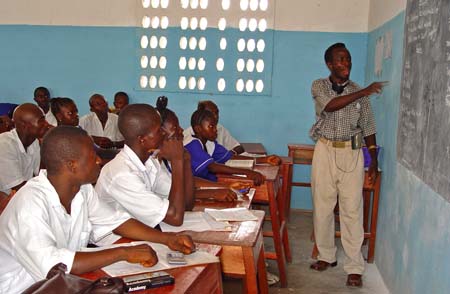By Amin Kef Sesay
The 2018 theme for World Teachers Day was: “The right to education means the right to a qualified teacher”. It was chosen to mark the 70th anniversary of the Universal Declaration of Human Rights (1948), where education is recognized as a key fundamental right – A right that cannot be fulfilled without qualified teachers.
Trained and qualified teachers are fundamental to the right to education. To move the country’s shameful state of education to another level where the majority that go through it can read, spell, write, do basic arithmetic and mathematics calculations well, and think rationally and reason and behave properly, there is an increasing demand from stakeholders (i.e. Governments, learners, parents and employers) to ensure quality, value for money and the success of learners.
While within the past decade there have been tremendous efforts made to improve access and ensure equity; quality has in most instances been compromised. In which regard, reports monitored across the country recently told a deeply frustrating story by majority of students in public funded schools that they go to school, spend the entire day with, if they are lucky, only one or two teachers entering their classrooms to teach them.
“The teachers do not teach at all,” many of the students interviewed lamented.
“The best they do is to give assignments which to have them marked you have to pay for in cash or sex or other material payments,” one girl in one of the secondary schools in the far east of Freetown told this Press pointedly.
This is hardly the kind of teacher-learner environment that His Excellency President Bio expects his dream of quality education for over two million learners in the primary and secondary categories of the education system to get quality education.
The decrease in wages in Sierra Leone since the 1980s has had a harmful effect on the quality of education, by de-motivating teachers and particularly those who are trained, qualified and experienced from seeing teaching as a career, as other well paid motivated employees in the civil service do.
As such, recruitment of thousands of new teachers by the Government does not necessarily solve the problem of providing our kids with quality education.
Sad fact is that, the majority of teachers in our schools, especially in the rural areas are untrained, unqualified and not career teachers.
In providing the much needed quality that will make education useful and productive for those that go through the systems, most important is enhancing teacher education for bridging the education quality gap that is very widespread in the country.
This fundamental restructuring of the learning system is crucial if we are to accelerate progress towards the Education for All and education-related Sustainable Development Goals – particularly SDG4 on inclusive and equitable quality education and especially target 4.c on increasing the supply of qualified teachers through international cooperation for teacher education/training, and SDG9 on innovation.
It was in this light that the first World Teachers’ Day was held on 5 October 1994 to celebrate the role teachers’ play in providing quality education at all levels that enables children and adults of all ages to learn to take part in and contribute to their local community and global society.
As the situation in the county stands, there are no established benchmarks regarding the rights and responsibilities of teachers and standards for their initial preparation and further education, recruitment, employment, teaching and learning conditions.
To provide the backbone for injecting quality into the country’s moribund educational systems, the focus has to be placed heavily on teachers’ professional development and other areas of learning related to the continuum of education (i.e. curriculum teaching and learning materials and measurement of learning outcomes).
Specific objectives must include:
- Addressing the issue of teacher quality;
- Promoting the integration of ICT into teaching and learning;
- Promoting appropriate learner assessment approaches to ensure quality learning and teaching;
To improve the learning systems and learning outcomes satisfactorily, the above call for marked capacity building in all departments and aspects of the primary and secondary educational systems that currently is hardly on a durable, sustainable basis.
As such, going forward, much more needs to be done not only to pursue the goals of access and equity but also relevance and quality simultaneously with the aim of ensuring the success of learners.




